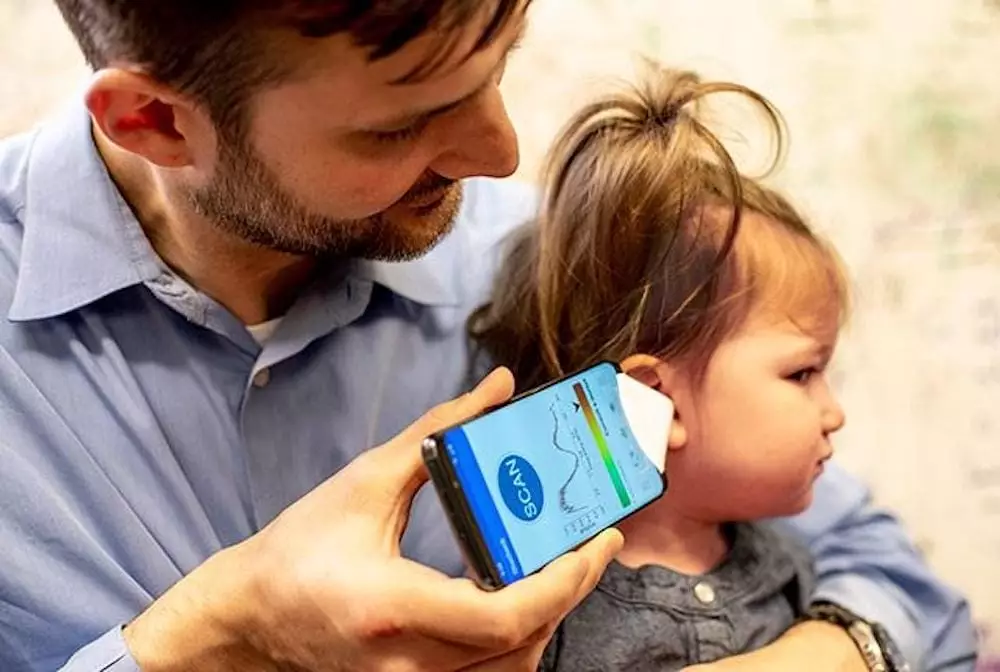In every parent’s journey, navigating the landscape of pediatric health can be challenging, particularly when it comes to discerning the symptoms of ear infections. The all-too-familiar scene often unfolds: your child is fussy, grasping at their ear, prompting a hasty visit to the pediatrician. However, to many parents’ dismay, they often find themselves sent home with a clean bill of health, yet still concerned about their child’s discomfort. Fortunately, breakthrough research from the University of Washington heralds a significant advancement—a smartphone app designed to assist parents in identifying potential ear infections from home.
Understanding Ear Infections
Ear infections can typically arise from fluid accumulation behind the eardrum, leading to pain and potential hearing impairment. The discomfort associated with these infections is not only distressing for children but can be a source of anxiety for parents unsure about their child’s condition. Raising awareness about the causes of ear infections is crucial. They often stem from viral upper respiratory infections that leave children susceptible to secondary infections. Thus, the introduction of an innovative at-home assessment tool promises not only to alleviate parental worry but also to potentially reduce the burden on healthcare systems.
The new app from the UW School of Medicine employs a straightforward yet ingenious concept. Utilizing a simple funnel constructed from paper, parents can connect their smartphone to the ear of a child, allowing the device to play specific tones. The app’s algorithm processes the sound waves, analyzing their reflection to determine the presence of fluid in the ear. This method taps into familiar auditory principles, akin to the way one might discern the sound of liquid in a wine glass by the pitch produced when tapped.
The researchers, led by Justin Chan, clarify that the approach uses machine learning techniques to refine its accuracy. This innovative fusion of technology with practical healthcare provides a window into a potentially more empowered parenting experience.
The foundation of this technology lies in rigorous research. Initial tests involved 53 children, half of whom were undergoing ear-related surgeries while the other half presented with unrelated medical conditions. Subsequent examinations confirmed the app could accurately identify the presence of ear fluid in a significant number of cases, with further testing on younger children echoing similar success rates.
Interestingly, even parents with little medical training displayed a competency in using the app comparable to that of healthcare professionals. This finding is especially important, as it underscores the potential accessibility of such technology, transforming how families manage and monitor health concerns at home.
While the implications of this development are undeniably exciting, it is essential to approach this innovation with a balanced perspective. The notion of a smartphone app capable of efficiently diagnosing ear issues could indeed reduce unnecessary pediatric appointments, enabling families to make informed decisions. However, it is important to recognize that this is still an emerging technology. As indicated by the cautions noted by health experts, parents should not completely forgo consulting a pediatrician, especially in urgent circumstances.
Current recommendations suggest that immediate medical advice is vital if a child exhibits severe symptoms—especially for infants and young children. Conditions like persistent fever, irritability, or discharge from the ear should prompt a visit to healthcare professionals regardless of the app’s readings.
A Future of Health Monitoring
As this technology continues to develop, it opens the door for a broader range of home-health monitoring applications. Parents can expect advancements to facilitate a proactive approach to child health, leaning on technology to provide support and peace of mind when they need it most. Thus, while the road ahead may still necessitate medical expertise, the combination of traditional health practices with innovative technology is poised to enhance the way families manage pediatric care. As researchers refine this application, many hope it could serve as a stepping stone towards a reality where parents are better equipped to deal with common health issues without resorting to stress-inducing trips to the clinic.

